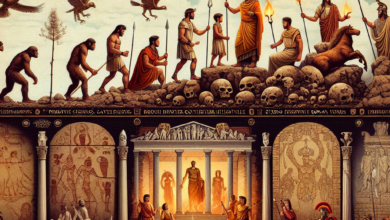In the ancient world, the Oracle of Delphi held a position of immense power and influence in Roman mythology. Considered the most important oracle in the classical world, Delphi was a sacred site dedicated to the god Apollo, where people from all over Greece and beyond would seek guidance and prophecy.
Located on the slopes of Mount Parnassus in central Greece, Delphi was believed to be the exact center of the world, the omphalos or navel of the earth. The site was considered the dwelling place of the god Apollo, who was known as the god of prophecy, music, healing, and light. According to myth, the site was originally sacred to Gaia, the Earth Mother, before Apollo claimed it as his own.
The role of the Oracle of Delphi was filled by a woman known as the Pythia, who served as a medium through which Apollo communicated his prophecies. The Pythia was chosen from among local women who were believed to possess a special connection to the divine. Before delivering her prophecies, the Pythia would undergo a ritual purification, including bathing in the sacred spring of Castalia at the foot of the temple.
Seekers of prophecy would come from far and wide to consult the Oracle of Delphi. They would present their questions or requests to the Pythia, who would then enter a trance-like state and deliver her answer in a cryptic and often ambiguous manner. The prophecies were delivered in the form of riddles or enigmatic phrases, which the seekers would then have to interpret and decipher for themselves.
The Oracle of Delphi was consulted on a wide range of matters, from personal decisions to matters of state and war. The prophecies were believed to be infallible, and great weight was placed on the Oracle’s words. Kings, generals, and even philosophers sought the guidance of the Oracle before making important decisions.
One of the most famous stories involving the Oracle of Delphi is the tale of King Croesus of Lydia. Croesus, known for his great wealth and power, consulted the Oracle before going to war with the Persian Empire. The Oracle famously told him that if he attacked the Persians, a great empire would fall. Confident in his interpretation of the prophecy, Croesus launched his campaign, only to be defeated and see his own empire fall.
The Oracle of Delphi was also consulted by famous figures such as Alexander the Great, who sought guidance before launching his conquest of the Persian Empire. The Oracle famously declared that Alexander was invincible, a prediction that proved to be true as he went on to conquer much of the known world.
In addition to its role as a center of prophecy, Delphi was also a site of religious pilgrimage and worship. The temple of Apollo housed a sacred hearth where a perpetual flame burned in honor of the god. The site was also home to numerous other temples and shrines dedicated to various gods and goddesses.
The Oracle of Delphi was at the height of its power and influence during the classical period, from the 8th to the 4th century BCE. However, with the rise of Christianity and the decline of the ancient Greek and Roman religions, the Oracle gradually fell out of favor. The last recorded consultation of the Oracle took place in the 4th century CE, after which the site fell into disuse and eventually was abandoned.
Today, the ruins of Delphi stand as a testament to the enduring legacy of the Oracle and the power of prophecy in ancient times. The site is now a UNESCO World Heritage Site and a popular tourist destination, drawing visitors from around the world to marvel at its mystical beauty and historical significance.
In conclusion, the Oracle of Delphi played a central role in Roman mythology as the most important oracle in the classical world. The Pythia’s prophecies were sought by kings, generals, and ordinary people alike, who believed in the Oracle’s power to reveal the will of the gods. Though the Oracle is no longer active, its legacy lives on in the stories and legends that have been passed down through the ages. The Oracle of Delphi remains a powerful symbol of the mysterious and often enigmatic nature of prophecy and divination in the ancient world.






